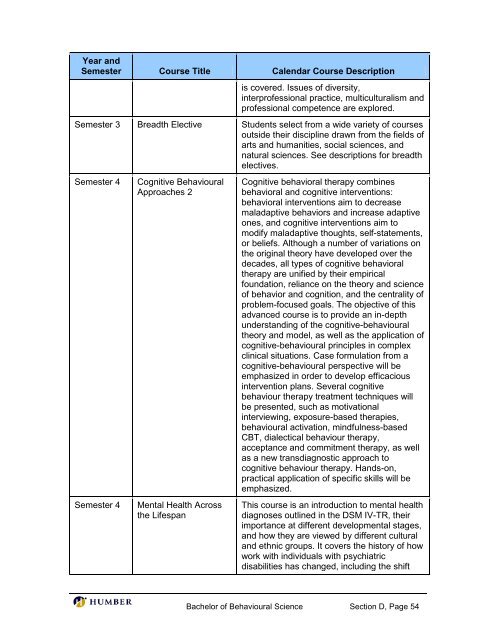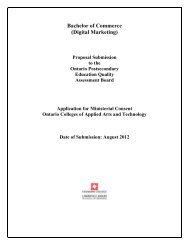Bachelor of Behavioural Science - Postsecondary Education Quality ...
Bachelor of Behavioural Science - Postsecondary Education Quality ...
Bachelor of Behavioural Science - Postsecondary Education Quality ...
Create successful ePaper yourself
Turn your PDF publications into a flip-book with our unique Google optimized e-Paper software.
Year and<br />
Semester Course Title Calendar Course Description<br />
is covered. Issues <strong>of</strong> diversity,<br />
interpr<strong>of</strong>essional practice, multiculturalism and<br />
pr<strong>of</strong>essional competence are explored.<br />
Semester 3 Breadth Elective Students select from a wide variety <strong>of</strong> courses<br />
outside their discipline drawn from the fields <strong>of</strong><br />
arts and humanities, social sciences, and<br />
natural sciences. See descriptions for breadth<br />
electives.<br />
Semester 4<br />
Semester 4<br />
Cognitive <strong>Behavioural</strong><br />
Approaches 2<br />
Mental Health Across<br />
the Lifespan<br />
Cognitive behavioral therapy combines<br />
behavioral and cognitive interventions:<br />
behavioral interventions aim to decrease<br />
maladaptive behaviors and increase adaptive<br />
ones, and cognitive interventions aim to<br />
modify maladaptive thoughts, self-statements,<br />
or beliefs. Although a number <strong>of</strong> variations on<br />
the original theory have developed over the<br />
decades, all types <strong>of</strong> cognitive behavioral<br />
therapy are unified by their empirical<br />
foundation, reliance on the theory and science<br />
<strong>of</strong> behavior and cognition, and the centrality <strong>of</strong><br />
problem-focused goals. The objective <strong>of</strong> this<br />
advanced course is to provide an in-depth<br />
understanding <strong>of</strong> the cognitive-behavioural<br />
theory and model, as well as the application <strong>of</strong><br />
cognitive-behavioural principles in complex<br />
clinical situations. Case formulation from a<br />
cognitive-behavioural perspective will be<br />
emphasized in order to develop efficacious<br />
intervention plans. Several cognitive<br />
behaviour therapy treatment techniques will<br />
be presented, such as motivational<br />
interviewing, exposure-based therapies,<br />
behavioural activation, mindfulness-based<br />
CBT, dialectical behaviour therapy,<br />
acceptance and commitment therapy, as well<br />
as a new transdiagnostic approach to<br />
cognitive behaviour therapy. Hands-on,<br />
practical application <strong>of</strong> specific skills will be<br />
emphasized.<br />
This course is an introduction to mental health<br />
diagnoses outlined in the DSM IV-TR, their<br />
importance at different developmental stages,<br />
and how they are viewed by different cultural<br />
and ethnic groups. It covers the history <strong>of</strong> how<br />
work with individuals with psychiatric<br />
disabilities has changed, including the shift<br />
<strong>Bachelor</strong> <strong>of</strong> <strong>Behavioural</strong> <strong>Science</strong> Section D, Page 54
















